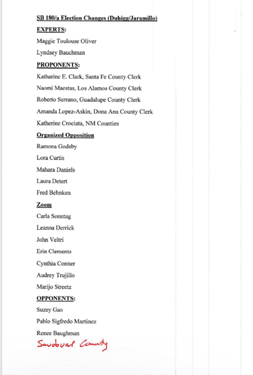Update on SB 180: Chairman of Senate Judiciary Committee denies opposition chance to speak, gives time to New Mexico’s most corrupt senator to lie to committee and the public instead
The Senate Judiciary Committee rushed SB 180 through its last committee stop on Friday night before sending it to the senate floor. Opponents of the bill were denied their equal time to speak, against the Senate Judiciary Committee’s procedures. However, Senator Daniel Ivey-Soto was allowed uninterrupted time to mislead the committee and the public. SB 180 would remove all election documents from public inspection, legalize ballot harvesting, and mandate a pause in counting on election night.
Sixteen opposition speakers were confirmed prior to the start of the hearing with Senate staff. This image shows the call sheet that was given to Chairman Joseph Cervantes prior to the start of the hearing:

All the proponents of the bill were allowed to speak without interruption – included Naomi Maestas, County Clerk of Los Alamos, who testified that the bill would “increase transparency.” As previously reported, the bill removes all election records from being classified as public documents which will make public oversight of future elections all but impossible.
When it was the turn of the opposition to speak, the chairman cut off the speakers after five had spoken, leaving a dozen members of the public without the ability to make their comments. These members of the public had been waiting all afternoon.
John Veltri, chairman of the New Mexico Election Integrity Transparency Network, was one of the people cut off. In an open letter to the committee he stated, “I, like the other eight folks in zoom queue, waited patiently and had to listen to five other Senate bills before getting to SB180, just to be not given the opportunity to exercise our first amendment right, which you Joseph took away from each of us…What you did tonight was inexcusable, and there are no reasons for it other than to push your own agenda and not to hear both sides of the coin. Personally, if I was you, I would be ashamed of myself and I would have a difficult time laying my head on my pillow tonight and resting peacefully. However, I am not here to judge you. I will leave that to a power far greater than me to do his work in due time.”
After cutting short the opposition to the bill, giving the committee the appearance that proponents and opponents were present in equal numbers, Senator Daniel Ivey-Soto took 10 minutes to defend himself and the origins of parts of SB 180 as exposed in several recent articles published by the Estancia News and The Gateway Pundit. This video was provided to the Estancia News of Senator Daniel Ivey-Soto’s comments.
Ivey Soto started his speech by lying to the committee stating, “Epollbooks are not regulated by the Voluntary Voting System Guidelines of the federal Election Assistance Commission.” This statement is false. According to Section 1.1 of the Election Assistance Commission’s Voluntary Voting System Guidelines (VVSGs), which are incorporated into state law, the components of the election system that must be certified are:
all system hardware, software, telecommunications, and documentation intended for use to: prepare the voting system for use in an election, produce appropriate ballot formats, test that the voting system and ballot materials have been properly prepared and are ready for use, record and count votes, consolidate and report election results, display results on-site or remotely, produce and maintain comprehensive audit trail.
Section 1.1 of the Election Assistance Commission’s Voluntary Voting System Guidelines, emphasis added.
Section 4 of the VVSGs further clarifies the scope of the VVSGs by listing specific components of hardware that are regulated. Ballot printers, computers used to prepare ballots are specifically listed. Section 4 also states,
This section applies to the combination of software and hardware to accomplish specific performance and system control requirements.
Section 4 of the Election Assistance Commission’s Voluntary Voting System Guidelines, emphasis added.
New Mexico’s electronic pollbook system is incorporated into the ballot-on-demand printing system that produces and prints the ballots. This puts them under the purview of the VVSGs, meaning they must be certified per state and federal law. The SOS acknowledges this fact as she has a set of documents on her website that she claims prove certification of the electronic pollbooks/ballot-on-demand system, though the documents are outdated and no longer valid for the current version of hardware and software being used.
Next, Ivey-Soto excused the appearance of bribery created by the fact that maximum campaign contributions were provided by his campaign to the two sponsors of SB 180, Senators Leo Jaramillo and Kay Duhigg. He stated, “Those were not funds that came from me. Those were not funds that came from any company that I’m associated with.” This excuse is a red herring, as the public has every reason to believe that Ivey-Soto has significant control over what happens to his own campaign funds and their donation could have improper influence over their recipients’ willingness to sponsor and support legislation written by Ivey-Soto.
Ivey-Soto stated that Dona Ana County has “received more scrutiny than any other county and there is nothing that has been shown about improprieties in the administration of elections in Dona Ana County, nor anything that affects the outcome of any of the elections in Dona Ana County.” That statement is a bold-faced lie, as the scrutiny referenced has revealed massive chain-of-custody problems in at least two races that flipped in the middle of the night. One was a US Congressional race in 2018, and the other was a State Representative, District 53 race in 2020.
Ivey-Soto claimed the allegations made against him in recent articles were “not factual” and called them “personal attacks.” All allegations made against Ivey Soto by this paper are based on campaign finance reports, contracts, and invoices provided by New Mexico counties. Ivey-Soto appears to be claiming that Dona Ana, Santa Fe, and Bernalillo Counties fabricated his long history of taking large sums of money from them while he was a sitting senator and writing and influencing legislation on their behalf contrary to the interests of his own constituency, and without full disclosure to his clients, colleagues, or the IRS.
Shutting down public comment and whitewashing corruption appear to be the kind of “transparency” the public can look forward to if the democrat-controlled legislature passes SB 180.
If you liked this article, check out the following four part series that dives into more details about Daniel Ivey-Soto’s corrupt dealings with Secretary of State Maggie Toulouse Oliver.
- “Daniel Ivey-Soto, New Mexico’s Most Corrupt Senator.” Part 1: The election thief’s favorite NM senator is hiding his backers and clients.
- “Secretary of State Maggie Toulouse Oliver, and County Clerk Amanda Askin, together Paid NM Senator Daniel Ivey-Soto $1.5 Million in Taxpayer Money– Why?” Part 2: Lucrative partisan activities.
- “New Mexico Senators with Blessing of Corrupt SoS Maggie Toulouse Oliver Push Legislation that Fully Corrupts NM Elections and Criminalizes Those Who Investigate.” Part 3: The destruction of the election franchise.
- “New Mexico’s Corrupt SOS, Maggie Toulouse Oliver, Tied to Twitter’s Illegal Speech Suppression Scheme after Violating First Amendment Rights of New Mexicans.” Part 4: Joint State Actors.
The public can provide tips to the Estancia News concerning this or other stories by sending an email to: [email protected].
- Breaking: Dominion/Liberty Vote Tabulator flips a vote in Chaves County – Changing the Outcome of a School Board Election - December 12, 2025
- Liberation for New Mexico is Coming - August 18, 2025
- ATTENTION DOGE: Department of Energy’s Land Grab in New Mexico and Colorado for “Green Energy” Must be Stopped - February 17, 2025


